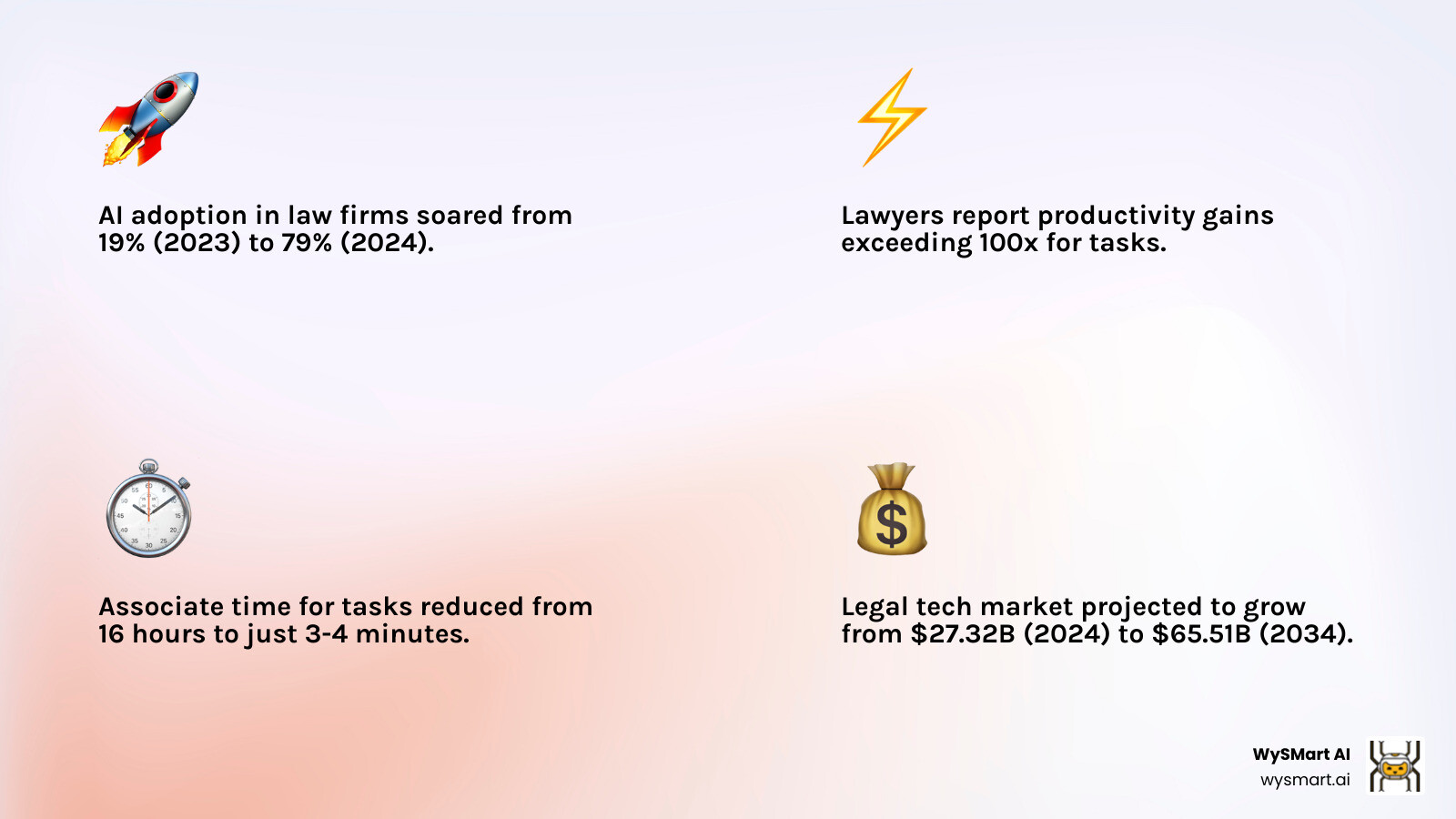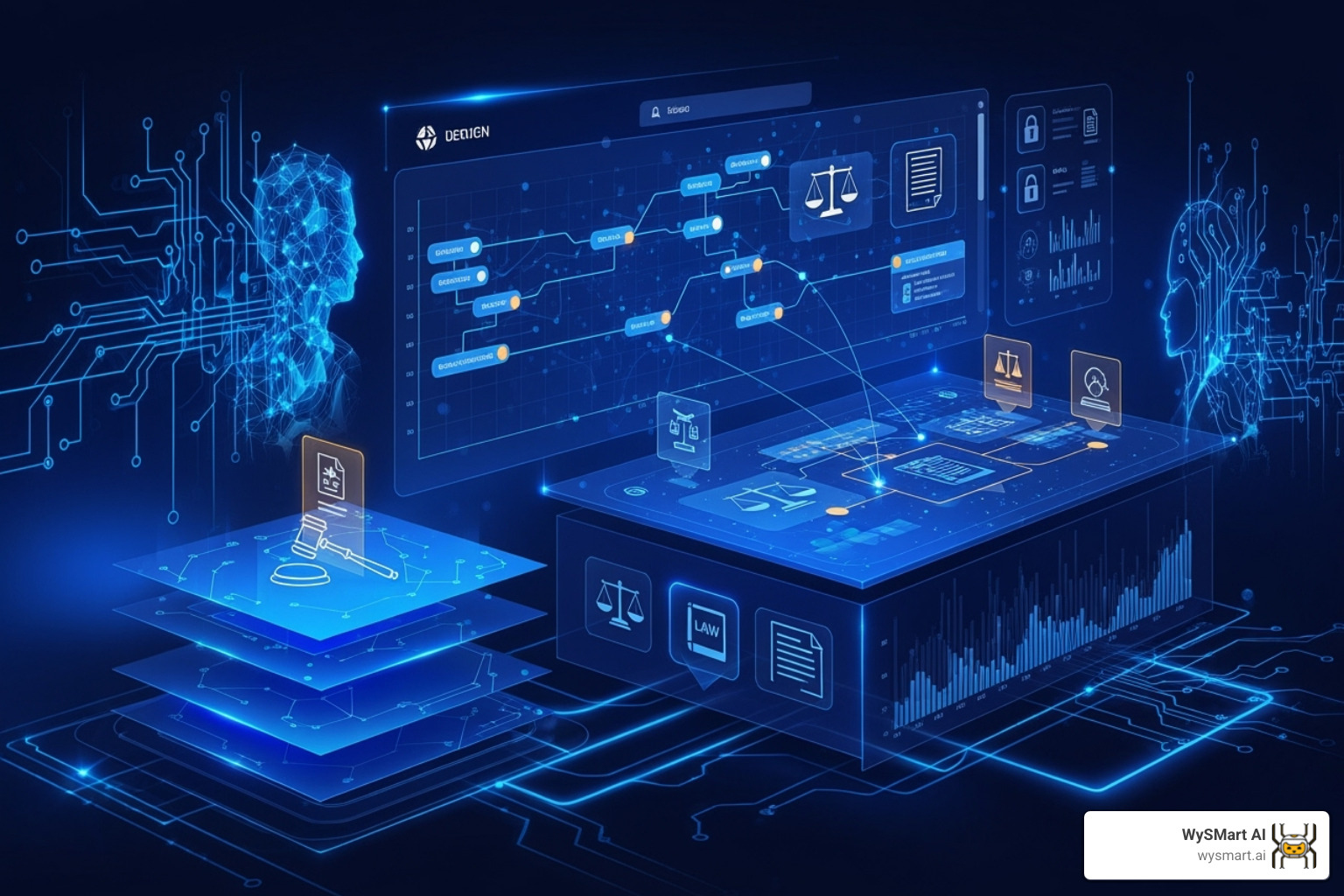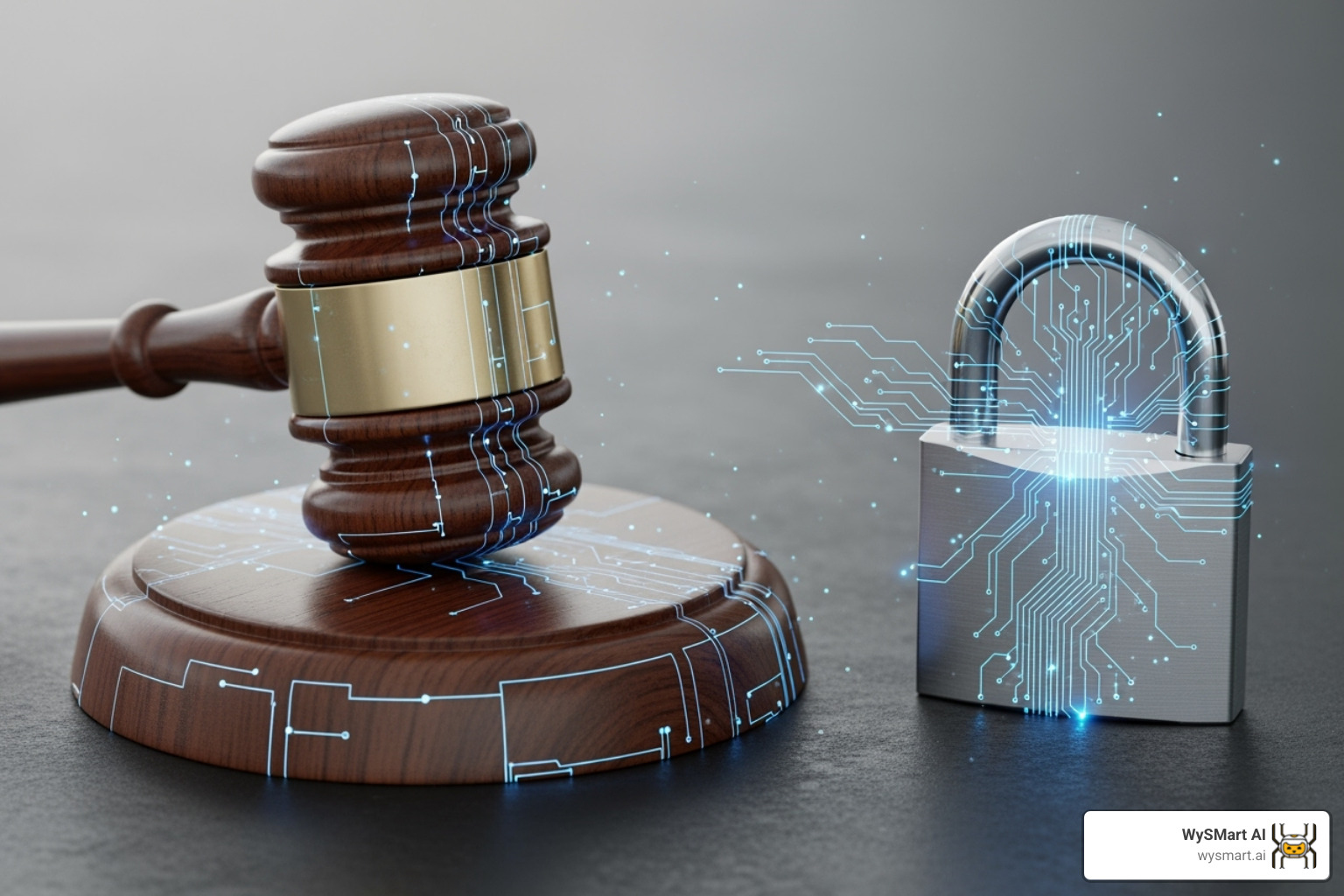
The AI Advantage: How Law Firms Are Leveraging Tech for Growth
The AI Revolution: Why Law Firms Can't Afford to Ignore AI
Law firm AI tools are changing legal practice at unprecedented speed. The statistics tell a compelling story: AI adoption in law firms skyrocketed from just 19% in 2023 to 79% in 2024. This isn't just about keeping up with trends—it's about survival in an increasingly competitive market.
The Most Essential Law Firm AI Tools:
Legal Research Platforms - Harvey, Lexis+ AI, Bloomberg Law AI Assistant
Document Review & Analysis - CoCounsel, Luminance, Diligen
Contract Management - Spellbook, IronClad, NexLaw
Litigation Support - LegalMation, Paxton, Darrow
Practice Management - Clio Duo, MyCase AI features
General Purpose Tools - ChatGPT, Claude AI, Gemini, Microsoft Copilot
The numbers are staggering. Lawyers report productivity gains greater than 100 times for specific tasks. One complaint response system reduced associate time from 16 hours to just 3-4 minutes. The legal tech market, valued at $27.32 billion in 2024, is projected to reach $65.51 billion by 2034.
But here's what the data doesn't capture: the human impact. AI isn't replacing lawyers—it's freeing them to focus on what matters most. Strategic thinking. Client relationships. Complex problem-solving that requires empathy and judgment.
The firms that accept AI now are already pulling ahead. They're handling more cases with the same staff, delivering faster results to clients, and building competitive moats that will be nearly impossible to overcome.
As Joey Martin, founder of WySMart.ai, I've spent years helping businesses leverage AI for growth, and I've seen how law firm AI tools can transform everything from client acquisition to case management. The legal industry is experiencing the same digital revolution that transformed other sectors—and the window for strategic adoption is closing fast.

This seismic shift isn't just about fancy new software; it's about re-engineering how law firms operate, from the ground up. We're talking about a quantum leap in productivity, leading to improved quality of service and higher client satisfaction. Imagine your team spending less time on tedious document review and more time crafting winning strategies or building deeper relationships with clients. That's the AI advantage.
Clients, too, are keenly aware of the value and risks associated with firms that leverage AI. They're not necessarily expecting reduced costs but rather quicker responses and a higher quality of service. This demand is pushing firms to rethink their business models, including the traditional billable hour, and invest in technology that allows them to scale expertise and deliver exceptional value. We believe that embracing this change is not just smart—it’s essential for long-term growth.
Find how WySMart.ai’s digital marketing services empower law firms
Understanding Law Firm AI Tools: General vs. Legal-Specific Solutions
When you're exploring law firm AI tools, it's like walking into a digital toolshed with two distinct sections. On one side, you'll find general-purpose AI tools—your versatile Swiss Army knives that can handle a surprising range of daily tasks. On the other side are legal-specific AI solutions—precision instruments crafted specifically for the complex world of legal practice.
Understanding this distinction isn't just academic; it's the difference between grabbing a hammer when you need a scalpel, or vice versa. Making the right choice determines not only your return on investment but also your ability to maintain ethical standards and client confidentiality. Let me walk you through both categories so you can make the smartest choices for your firm.
General-Purpose AI: Everyday Digital Assistants for Law Firms
Think of general-purpose AI as hiring a bright, eager intern who's available 24/7 and never needs coffee breaks. These tools—like ChatGPT, Claude AI, Gemini, and Microsoft Copilot—weren't built specifically for lawyers, but they've become incredibly valuable for streamlining the administrative and operational tasks that bog down legal professionals.
ChatGPT has become the poster child of AI assistance, and for good reason. At $20 per month for ChatGPT Plus, it's remarkably affordable for what it delivers. Need to draft a client follow-up email or a demand letter template? ChatGPT can help you strike the right tone. Working on marketing copy for your firm's website or a blog post about a recent legal development? It can generate ideas, create outlines, and polish your messaging. More advanced use cases include generating outlines for deposition questions based on a non-confidential case summary or creating social media posts to promote a firm's recent win.
Claude AI offers a compelling alternative, especially for firms concerned about data privacy and handling large documents. Anthropic designed Claude with a privacy-first approach—it generally doesn't use your conversations for training without explicit permission. This matters when you're handling sensitive information. Its larger context window makes it particularly adept at summarizing lengthy (but non-privileged) documents, such as expert witness reports or public transcripts, saving hours of reading time. Claude Pro runs $20 monthly, while Claude Team costs $30, offering improved features for collaborative work.
Gemini, Google's AI offering, brings real-time web access to the table. Unlike some AI models that have knowledge cutoff dates, Gemini can pull current information, making it valuable for staying updated on legislative changes, recent court rulings, or news affecting a client's industry. At $20 per month for Gemini Advanced, it's competitively priced and integrates deeply with Google's ecosystem, allowing it to summarize long email chains in Gmail or create meeting agendas from a Google Doc.
For firms already invested in Microsoft's ecosystem, Copilot for Microsoft 365 is a natural fit at $30 monthly. It seamlessly integrates with Word, Excel, and Outlook, helping you analyze data trends, summarize lengthy email chains, and draft responses. For example, you can use Copilot in Excel to analyze billing data to identify trends in realization rates or use it in PowerPoint to instantly create a client-facing presentation from a Word document outline. The beauty is that it inherits Microsoft 365's existing security and compliance features, offering a more secure environment than public-facing tools.

Here's the reality check: these law firm AI tools are fantastic for productivity tasks that don't involve confidential client data. They can help with marketing content creation, email drafting, basic research, and document summarization. However—and this is crucial—they're not trained on legal data specifically. They can "hallucinate" information, generating responses that sound authoritative but are completely wrong. Always verify AI-generated work, especially anything that might influence legal decisions. And be extremely cautious about inputting confidential information. Many of these tools use data for training purposes unless explicitly stated otherwise. When in doubt, keep sensitive client information out of general-purpose AI tools entirely.
Legal-Specific AI Solutions: Precision Tools for Law Firm Success
Now we're talking about the heavy hitters—AI tools built specifically for legal practice. These law firm AI tools understand legal terminology, are trained on vast legal databases, and come with the security features that law firms absolutely need. Think of them as hiring a specialized expert rather than a generalist.
Harvey AI represents the cutting edge of legal AI, built on OpenAI's technology but specifically trained with legal data from sources like Thomson Reuters. It excels at contract analysis, due diligence, and legal research with domain-specific accuracy. Harvey provides secure project workspaces and workflow automation designed for legal teams, making it a favorite among Am Law 100 firms. Their platform varies by region, with versions for US, EU, and AU markets.
CoCounsel, powered by OpenAI but trained specifically for legal work, has become a game-changer for legal research and document review. What makes it special is its ability to analyze thousands of cases to identify relevant precedents—something that would take human researchers days or weeks. It features a suite of "skills" designed to mimic legal workflows, such as preparing for a deposition, drafting a research memo, or analyzing a document database. Thomson Reuters backs it with their extensive legal database, giving it credibility and depth.
Luminance offers what they call "Legal-Grade™ AI" for contract processing and review. Their innovative "Panel of Judges" approach uses multiple AI models to ensure specialized expertise across different legal areas. It can automate contract negotiation by comparing incoming contracts against a firm's internal playbook and provide intelligent contract repository management. Over 700 organizations trust Luminance, which speaks to its reliability in the legal field.
For transactional lawyers, Spellbook is changing contract drafting. It learns from your firm's existing templates and drafting preferences, creating a customized experience that significantly reduces document creation time. It can suggest alternative clauses, identify missing or unusual terms, and even flag potentially aggressive language from opposing counsel. It's like having a senior associate who never forgets your firm's style preferences.
Lexis+ AI represents the evolution of legal research, combining LexisNexis's massive legal database with advanced AI. Its natural language interface lets you ask complex legal questions and receive precise, contextually relevant answers with proper citations. It can summarize cases, compare jurisdictions, and generate argument outlines, all while ensuring the underlying sources are verifiable. For firms that live and breathe legal research, this is a quantum leap forward.

Beyond these, the legal-specific AI landscape is expanding into highly specialized domains:
E-Discovery and Document Review: This was one of the first areas to be transformed by AI. Platforms like Relativity and Everlaw use Technology-Assisted Review (TAR) and machine learning to analyze millions of documents in litigation or investigations. They can predict which documents are relevant, flag privileged information, and identify key themes, reducing the need for manual review by armies of associates and saving clients enormous costs.
Litigation Analytics: Tools like Lex Machina (from LexisNexis) and Gavelytics provide data-driven insights into the litigation landscape. They analyze millions of court records to reveal how specific judges rule on certain motions, how opposing counsel behaves, and the likely duration and outcomes of similar cases. This allows firms to develop more informed case strategies, better predict costs, and advise clients with greater confidence.
Contract and Clause Identification: Diligen makes contract review dramatically more efficient using machine learning to identify specific clauses, provisions, or changes across multiple documents. This is invaluable during due diligence or when managing a large portfolio of agreements.
Case Opportunity Generation: Darrow.ai takes a unique approach, using AI to analyze publicly available data to detect potential legal violations—essentially finding new class-action or mass tort opportunities for plaintiff firms.
Secure Legal LLMs: Platforms like LawGPT are built by lawyers for lawyers, emphasizing data security with private, firewalled data lakes for client information, addressing the core confidentiality concerns of the profession.
Looking ahead, Clio Duo represents the next generation of practice management AI, designed to integrate seamlessly with existing Clio workflows while acting as a coach, collaborator, and consultant, helping with everything from billing to client communication.
These specialized tools offer significant advantages over general-purpose AI. They're more accurate for legal tasks, provide legal-specific insights, and come with enterprise-grade security designed for handling confidential client data. Yes, the investment is typically higher than general-purpose tools, but the improved accuracy, reduced risk, and specialized functionality often deliver substantial returns by enabling lawyers to focus on high-value strategic work.
Navigating the Risks: Security and Ethics in Law Firm AI

Here's the reality: law firm AI tools are incredibly powerful, but with great power comes great responsibility. As legal professionals, you're not just handling any business data—you're the guardians of attorney-client privilege, confidential case information, and your clients' most sensitive details. Adopting AI without a deep understanding of the associated risks is not just a technological misstep; it's an ethical minefield.
Think of AI adoption like hiring a new paralegal. You wouldn't hand over your most confidential files without proper training, oversight, and security protocols, right? The same principle applies to AI, except the stakes can be even higher due to the speed and scale at which data can be exposed or misused.
The Core Ethical Obligations
The American Bar Association's Model Rules of Professional Conduct provide the ethical framework, and several rules are directly implicated by the use of AI.
Rule 1.1: Competence: This rule requires lawyers to provide competent representation, which includes "the legal knowledge, skill, thoroughness and preparation reasonably necessary." Crucially, Comment 8 to this rule clarifies that a lawyer must "keep abreast of changes in the law and its practice, including the benefits and risks associated with relevant technology." This means you have an affirmative duty to understand the AI tools you use—you can't plead ignorance about how they work, their limitations, or their potential for error.
Rule 1.6: Confidentiality of Information: This is perhaps the most critical rule in the context of AI. It requires lawyers to make "reasonable efforts to prevent the inadvertent or unauthorized disclosure of, or unauthorized access to, information relating to the representation of a client." Using a public AI tool that uses your inputs for training could be a direct violation of this rule. "Reasonable efforts" now includes thoroughly vetting your AI vendor's security protocols and data handling policies.
Rules 5.1 & 5.3: Supervisory Duties: These rules hold partners and supervising lawyers responsible for the conduct of their subordinates. Courts and bar associations have made it clear that AI is treated like a non-lawyer assistant. You are responsible for its work product. If an AI tool "hallucinates" and generates a fictional case citation that you include in a brief, you are the one who will be sanctioned by the court, not the AI. This underscores the non-negotiable need for human verification and oversight.
The Treacherous Trio of AI Risks
Beyond the ethical rules, three practical risks demand your attention:
Data Confidentiality and Security: Many general AI models treat your input as training data, which means that confidential client information could inadvertently become part of a public model's knowledge base. Imagine explaining to your client that their sensitive merger details are now floating around in an AI system accessible to competitors. The solution is to prioritize AI providers with zero-data retention policies—meaning they don't store your information or use it for training purposes. Furthermore, the work product doctrine, which protects materials prepared for litigation, could be jeopardized if prompts and outputs are stored on a third-party server and become discoverable.
AI "Hallucinations": This is the technical term for when an AI generates completely fabricated information with complete confidence. For lawyers, this isn't just embarrassing; it's potentially career-ending. Recent cases have shown attorneys being sanctioned for submitting AI-generated citations that simply didn't exist. The AI presented them with perfect formatting and convincing language, but the cases were entirely fictional. This risk extends beyond citations; an AI could invent facts in a case summary, misstate the holding of a real case, or draft a contract clause with unintended legal consequences. Every single output must be fact-checked against a reliable source.
Algorithmic Bias: AI models learn from historical data, and if that data contains societal biases (related to race, gender, or socioeconomic status), the AI will learn and perpetuate them. This could affect everything from an AI's assessment of a case's viability to predictive analytics used for sentencing recommendations, potentially leading to unfair outcomes for your clients and exposing your firm to liability.
A Practical Checklist for Vetting AI Tools
Before integrating any AI tool that will handle client information, your firm must conduct rigorous due diligence. Here are the essential questions to ask any vendor:
Data Handling: Can you provide written confirmation of a zero-data retention policy? Is our firm's data ever used to train your models?
Security Certifications: Are you SOC 2 Type II compliant? Can we review your latest report and any exceptions?
Data Residency: Where will our data be stored and processed? Do you offer options for keeping data within a specific jurisdiction (e.g., USA, EU)?
Encryption: Is our data encrypted both in transit (using TLS 1.2+) and at rest (using AES-256 or equivalent)?
Access Controls: What are your internal access control policies? Who at your company can access our data and under what circumstances?
Incident Response: What is your documented incident response plan in the event of a data breach? How and when would our firm be notified?
State bar associations are actively issuing guidance on AI use, with Florida's bar opinion advising lawyers to review AI work like a paralegal's output and ensure AI doesn't handle tasks requiring personal legal judgment. The message is clear: the efficiency gains from AI are remarkable, but they must never compromise the trust your clients place in you. Remember: AI is your assistant, not your replacement, and human oversight isn't just recommended—it's ethically required.
How to Choose the Right AI Tools for Your Law Firm
Choosing the right law firm AI tools is like finding the perfect legal partner—it requires careful consideration, due diligence, and a clear understanding of your firm's unique DNA. There's no magic formula that works for everyone, but there's definitely a smart approach that can save you time, money, and headaches down the road.
Start by identifying your firm's unique needs. Before you get impressd by flashy AI demos, take a step back and audit your daily operations. Where does your team spend the most time on repetitive tasks? Are you drowning in document review? Struggling with legal research efficiency? Wrestling with client intake processes? The answers to these questions will point you toward the AI solutions that can make the biggest impact on your bottom line.
If you're handling high-volume litigation, for example, tools designed specifically for that workflow will serve you better than general-purpose solutions. The key is being honest about your pain points—not just the ones that sound impressive in partner meetings.
Security protocols are absolutely non-negotiable. We can't stress this enough: client confidentiality isn't just about ethics—it's about your firm's survival. Look for law firm AI tools that offer enterprise-grade security measures, including SOC 2 compliance, ISO certifications, and crystal-clear data privacy policies. Zero-data retention policies should be at the top of your checklist. If a vendor can't explain their security measures in plain English, keep looking.
Consider the user interface and ease of use because even the most powerful AI tool becomes useless if your team can't figure out how to use it. The best technology is invisible—it should feel like a natural extension of how your team already works. Tools with steep learning curves often end up gathering digital dust, no matter how much you paid for them.
Check for integrations with your current systems to avoid creating information silos. Does the AI tool play nicely with your practice management software, document management system, or CRM? Seamless integrations ensure that valuable data flows smoothly between systems, rather than creating more work for your already busy team.
Assess vendor reputation and support like you would any critical business partner. Look for providers with a proven track record in the legal tech space. What kind of customer support do they offer? Are training resources readily available? A reliable vendor becomes your partner in the AI journey, not just another software subscription you're paying for.
Start with a pilot project rather than trying to revolutionize your entire firm overnight. Select one specific task or practice group to test an AI tool. This approach lets you evaluate real-world effectiveness, measure actual ROI, and gather honest feedback from your team before committing to a larger rollout. Think of it as a test drive before buying the car.
The best AI tool for your law firm is ultimately the one that aligns perfectly with your goals, workflow, and security requirements. At WySMart.ai, we understand that navigating the AI landscape can feel overwhelming—especially when you're focused on serving clients and growing your practice. That's why we've developed AI-powered solutions specifically designed to handle your marketing, client engagement, and operational challenges, so you can focus on what you do best: winning cases and building client trust.
Get AI-powered web help for your firm
Frequently Asked Questions about Law Firm AI Tools
As we work with law firms across the country, helping them steer the digital marketing landscape, we hear the same questions about AI over and over again. Let's address the big ones that keep partners awake at night.
Will AI replace lawyers?
Here's the short answer: No—AI is a powerful assistant, not a replacement.
Think about it this way: AI can power through 500,000 findy documents overnight, spot relevant clauses in contracts faster than any human, or draft a first pass of a legal memo. But can it comfort a distressed client going through a difficult divorce? Can it read a jury's body language and adjust strategy mid-trial? Can it build the trust that's essential to every attorney-client relationship?
Law firm AI tools excel at automating repetitive, low-value tasks—the kind of work that keeps talented lawyers stuck at their desks until midnight. This frees up legal professionals to focus on what truly matters: high-level strategy, client relationships, and the complex problem-solving that requires human expertise, judgment, and empathy.
AI lacks the emotional intelligence to steer sensitive family law matters. It can't make the nuanced strategic judgments that win cases. And it certainly can't argue persuasively in court or build the personal connections that turn clients into lifelong advocates for your firm.
What AI does exceptionally well is amplify your existing capabilities. It's like having a brilliant research assistant who never sleeps, never gets tired, and can process information at superhuman speed. The result? You get to do more of what only you can do—practice law at the highest level.
How much do law firm AI tools cost?
The pricing landscape for law firm AI tools varies dramatically, and honestly, that's because you're looking at two completely different categories of solutions.
General-purpose AI tools like ChatGPT, Claude AI, and Gemini are surprisingly affordable. Most offer free versions that handle basic tasks, while premium subscriptions typically run $20-$30 per month per user. These are fantastic for everyday tasks like drafting emails, brainstorming marketing content, or getting a quick summary of non-confidential documents.
Legal-specific AI platforms are a different beast entirely. These are enterprise-level investments with custom pricing that reflects their specialized training, advanced features, and the enterprise-grade security that law firms require. We're talking about platforms built on vast legal databases, trained specifically on legal language and procedures, and designed with the unique compliance needs of law firms in mind.
While the investment might seem substantial at first glance, the return on investment can be staggering. Remember those productivity gains we mentioned earlier—some lawyers report efficiency improvements of 100 times or more for specific tasks. That's not just saved time; that's transformed capacity. More billable hours, better case outcomes, and the ability to serve more clients without hiring additional staff.
At WySMart.ai, we understand that budget considerations are real for every business. That's why we offer flexible plans for our AI-powered digital marketing and web solutions. We also provide a risk-free trial so you can experience the benefits and see the ROI for your firm before making any long-term commitment. No guesswork—just measurable results.
How can our firm ensure client data is secure when using AI?
This question hits at the heart of every lawyer's professional responsibility, and rightfully so. Protecting client confidentiality isn't just an ethical obligation—it's the foundation of trust that your entire practice is built on.
The key is taking a proactive, multi-layered approach to AI security. Start by choosing tools with enterprise-grade security standards. Look for providers that maintain SOC 2 compliance, ISO 27001 certification, and adherence to privacy regulations. These aren't just fancy badges—they represent rigorous, audited controls over how your data is handled, stored, and protected.
Zero-data retention policies are non-negotiable for any AI tool handling sensitive legal information. This means the provider doesn't store your input data or use it to train their public models. It's a critical differentiator that separates professional-grade legal AI from consumer tools.
You'll also want to understand data residency—where exactly are the servers processing and storing your information? Are they located in jurisdictions that align with your firm's privacy requirements and your clients' expectations?
But technology is only part of the equation. Strong internal policies are equally important. Even the most secure AI tool can't protect against human error. Your team needs clear guidelines about what information can and cannot be entered into AI systems, especially general-purpose tools that might not have the same security protocols as legal-specific platforms.
Don't skip the fine print, either. Those terms of service and privacy policies might be tedious to read, but they contain crucial information about how your data will be handled. When in doubt, ask questions. Any reputable AI provider should be transparent about their security measures and happy to address your concerns.
At WySMart.ai, our AI toolbox is built with law firm security and compliance at its core. We understand that your reputation—and your clients' trust—depends on getting this right. That's why data protection isn't an afterthought in our solutions; it's baked into everything we do, from digital marketing automation to client engagement tools.
The Verdict: Your Next Move in the AI-Powered Legal Landscape
The evidence is clear: law firm AI tools have moved from "nice to have" to "must have" in today's legal landscape. We're witnessing a fundamental shift that's reshaping how law firms operate, compete, and serve their clients. The firms embracing this change aren't just staying afloat—they're pulling ahead with unprecedented speed and efficiency.
Think about it: productivity gains of over 100 times for specific tasks, document review reduced from 16 hours to 3-4 minutes, and a legal tech market exploding from $27.32 billion to a projected $65.51 billion by 2034. These aren't just numbers—they represent real attorneys who now spend their days on strategic thinking instead of tedious document sifting, real clients receiving faster and more comprehensive service, and real firms building competitive advantages that will be nearly impossible for their competitors to overcome.
But here's what excites me most about this AI revolution: it's not about replacing the human touch that makes legal practice so vital. Instead, it's about amplifying what lawyers do best—building relationships, crafting winning strategies, and providing the empathy and judgment that no algorithm can replicate.
At WySMart.ai, we've spent years helping small businesses harness the power of AI for growth, and law firms are no exception. While you're mastering AI tools for legal research and case management, we're here to handle the other side of your success equation: client acquisition and marketing. Our done-for-you AI toolbox takes care of your digital marketing heavy lifting—from reputation management and review generation to local SEO and Google My Business optimization—so you can focus entirely on winning cases and building client trust.
We understand that running a successful law firm means excelling at both legal work and business development. That's where our AI-powered solutions shine. Whether you need email marketing automation to nurture leads, social media marketing to build your brand, or website design services that convert visitors into clients, we've got you covered. Our team handles everything from directory listings optimization to PPC management, ensuring your firm gets found by the right clients at the right time.
The legal profession is evolving rapidly, and the firms that thrive will be those that accept AI strategically—both for their legal work and their business growth. You're already investing in AI tools to transform your practice. Now let us show you how AI can transform your client pipeline and marketing results.
Ready to see how AI can transform your client acquisition and marketing?
Start your 7-day free trial or book your demo today!
WySMart.ai: The Done-For-You AI Toolbox for Law Firms
Risk-free trial & money-back guarantee
AI-powered marketing, reputation, and client engagement
Hire your AI employee and see the future of law firm growth